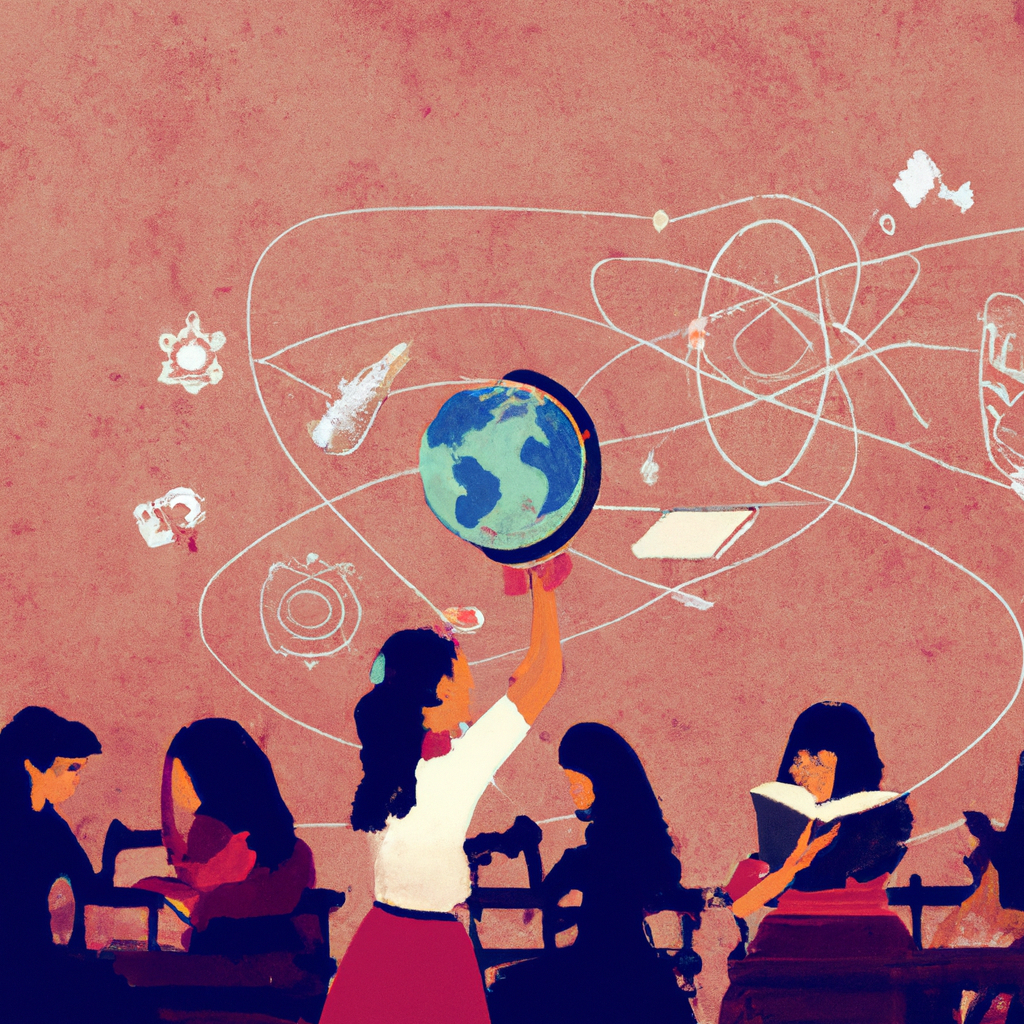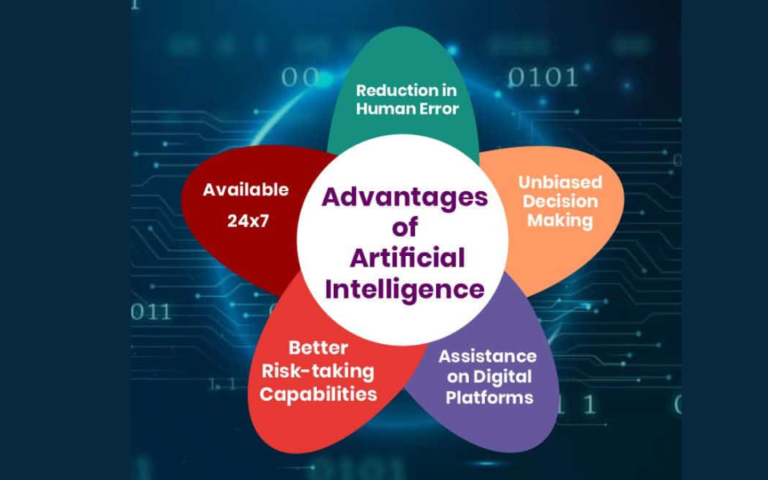The Future Of AI In Education

Imagine a world where teachers have superpowers, tailored lessons are delivered to each student’s specific needs, and learning is engaging and fun. This is not a distant dream, but a glimpse of the future brought to you by the ever-advancing field of Artificial Intelligence (AI) in education. With AI’s ability to analyze vast amounts of data and adapt to individual learning styles, it has the potential to revolutionize the way we learn and teach. In this article, we will explore the exciting possibilities and potential challenges of AI in education, providing a glimpse into what the future holds for this groundbreaking technology.
Benefits of AI in Education
Enhanced Personalization
AI in education offers enhanced personalization by tailoring the learning experience to the individual student’s needs and preferences. Through sophisticated algorithms, AI systems can analyze vast amounts of data about a student’s learning behavior, strengths, and weaknesses. This data can then be used to create personalized learning pathways, adaptive lesson plans, and targeted interventions. With AI, students can receive individualized instruction and support, allowing them to learn at their own pace and in a way that suits their unique learning style.
Improved Accessibility
Another significant benefit of AI in education is improved accessibility. AI-powered tools can remove barriers to learning for students with disabilities or learning difficulties. For example, speech recognition technology can support students with speech impairments, while text-to-speech software can assist those with reading difficulties. Additionally, AI can provide real-time translation services, enabling students who are non-native speakers to participate fully in classroom activities and understand the learning materials.
Adaptive Learning
AI enables adaptive learning, which means that educational content and activities are dynamically adjusted to meet the specific needs of each student. By continuously monitoring a student’s progress and understanding, AI systems can deliver personalized recommendations, additional resources, and targeted remediation when necessary. Adaptive learning ensures that students are neither overwhelmed with content beyond their comprehension nor bored with repetitive material. With AI, each student can receive a customized learning experience that maximizes their potential for growth and achievement.
Efficient Grading and Feedback
Traditionally, grading assessments and providing feedback to students has been a time-consuming task for educators. However, AI-powered systems can automate the process, saving teachers valuable time and allowing them to focus on instructional activities. AI can accurately and efficiently grade multiple-choice questions, numerical calculations, and other objective assessments. Additionally, AI can provide timely and detailed feedback to students on their assignments, highlighting areas for improvement and offering suggestions for further study. This immediate feedback helps students track their progress and make necessary adjustments to their learning strategies.
Streamlined Administrative Tasks
AI can streamline administrative tasks in education, freeing up educators’ time for more meaningful and impactful work. For instance, AI-powered systems can automate the scheduling of classes, exams, and meetings, optimizing the allocation of resources and reducing the likelihood of scheduling conflicts. AI can also assist in managing student records, generating progress reports, and handling routine communication with parents, allowing educators to focus on instructional planning and delivering high-quality lessons. By automating administrative tasks, AI technology ensures that educators can devote their energy to fostering a positive and engaging learning environment.
Challenges and Limitations
Quality and Reliability
One of the challenges associated with AI in education is ensuring the quality and reliability of the AI systems and their educational content. AI algorithms are only as good as the data they are trained on, so it is crucial to have accurate and diverse datasets to avoid biased or incomplete results. Additionally, educators and educational institutions need to critically evaluate the educational content provided by AI systems to ensure it aligns with curriculum standards and promotes deep learning.
Data Privacy and Security
As AI systems collect and analyze vast amounts of student data, data privacy and security become crucial concerns. Educational institutions must implement robust data protection measures to safeguard student information from unauthorized access or misuse. It is essential to comply with relevant data protection regulations and ensure transparency in how student data is collected, used, and stored.
Equity and Accessibility
While AI has the potential to enhance educational equity and accessibility, it can also exacerbate existing inequalities if not implemented thoughtfully. There is a risk that students from disadvantaged backgrounds or marginalized communities may not have equal access to AI-powered resources and opportunities. It is crucial to address these equity issues by ensuring equitable distribution of AI technologies and providing appropriate support to all students.
Ethical Concerns
AI in education raises ethical concerns that need to be carefully considered. For example, there is a risk of over-reliance on AI systems, leading to reduced human interaction and personalized guidance. It is important to strike a balance between leveraging AI for efficiency and preserving the social and emotional aspects of learning. Additionally, ethical considerations should guide the development and use of AI algorithms to ensure fairness, transparency, and accountability.

AI-Powered Intelligent Tutoring Systems
Individualized Guidance
AI-powered intelligent tutoring systems provide individualized guidance to students by analyzing their performance, preferences, and learning patterns. These systems can adapt the curriculum and instructional strategies based on the student’s unique needs, helping them overcome learning challenges and achieve their academic goals. With personalized guidance, students can receive targeted support and progress at their own pace, maximizing their learning potential.
Real-time Monitoring
Intelligent tutoring systems equipped with AI can monitor students’ progress in real-time, providing educators with valuable insights into their strengths, weaknesses, and misconceptions. This real-time monitoring allows for timely interventions and targeted instructional support. Educators can identify areas where students are struggling and address them promptly, ensuring that learning gaps are identified and remediated promptly.
Adaptive Recommendations
AI-powered intelligent tutoring systems can provide adaptive recommendations for further study and practice. By analyzing a student’s performance and learning history, these systems can suggest additional resources, activities, or lessons that align with the student’s learning objectives and support their ongoing progress. Adaptive recommendations help students explore topics in greater depth, reinforce their understanding, and engage in self-directed learning.
Knowledge Acquisition and Retention
Intelligent tutoring systems can also assist students in acquiring and retaining knowledge effectively. Through AI algorithms, these systems can identify the most optimal sequences of learning activities and content presentation, taking into account each student’s prior knowledge and learning style. By delivering information in an engaging and personalized manner, AI-powered tutoring systems can improve students’ comprehension and retention of key concepts.
Virtual Assistants in the Classroom
Supporting Teachers with Administrative Tasks
Virtual assistants can immensely help teachers by taking care of mundane administrative tasks, such as creating and organizing lesson plans, scheduling appointments, and managing classroom resources. By offloading these time-consuming responsibilities to virtual assistants, teachers can dedicate more time and energy to instructional planning, delivering engaging lessons, and providing individualized support to their students.
Answering Student Queries
Virtual assistants can also provide immediate and accurate answers to student queries, acting as a virtual teacher’s aide. Students can ask questions verbally or type them in, and the virtual assistant will analyze the query and provide an appropriate response or direct the student to relevant resources. This immediate access to information and support fosters independent learning and empowers students to take control of their own learning process.
Facilitating Group Collaboration
Virtual assistants can facilitate group collaboration by organizing and coordinating group assignments, discussions, and projects. They can assist in creating virtual spaces for collaboration, assigning roles and responsibilities, and ensuring that group activities run smoothly. Virtual assistants can also provide reminders and notifications to keep students on track and facilitate effective teamwork.
Providing On-Demand Resources
Virtual assistants can serve as a valuable source of on-demand resources for students. They can recommend relevant books, articles, videos, and other learning materials based on the student’s interests, learning style, and academic goals. This personalized curation of resources ensures that students have access to high-quality and relevant materials, enhancing their learning experience and promoting independent exploration.

Revolutionizing Assessment and Feedback
Automated Essay Grading
AI technology can automate the grading of essays and other written assignments, saving teachers significant time and effort. By analyzing various linguistic and structural features, AI algorithms can provide objective and consistent evaluations of students’ writing. Automated essay grading not only accelerates the feedback process but also reduces the likelihood of subjective bias, ensuring fair and impartial assessment.
Personalized Feedback
AI enables the provision of personalized feedback to students on their assignments and performance. Through natural language processing and machine learning algorithms, AI systems can analyze students’ work and deliver targeted feedback that highlights strengths and areas for improvement. This personalized feedback helps students understand their progress, identify areas where they need to focus, and make meaningful revisions.
Identifying Learning Gaps
AI technology can identify learning gaps by analyzing students’ performance on assessments and formative activities. By tracking each student’s responses and identifying patterns of misconceptions or weaknesses, AI systems can alert educators to specific areas where additional instruction or remediation is required. This information helps educators tailor their teaching strategies and interventions to address students’ individual needs effectively.
Tailored Remediation
Building on the identification of learning gaps, AI can provide tailored remediation activities to help students overcome their misconceptions or difficulties. Adaptive learning platforms can generate personalized remedial materials, exercises, or simulations that target the specific areas of weakness. With tailored remediation, students receive targeted support and can engage in focused practice to reinforce their understanding and skills.
Future of AI in Higher Education
Improved Course Design and Delivery
AI has the potential to revolutionize course design and delivery in higher education. With AI-powered analytics and data-driven insights, educators can continuously refine and enhance their courses to better meet students’ needs and optimize learning outcomes. AI can help identify effective instructional strategies, identify areas where students are struggling, and suggest improvements for future course iterations.
Efficient University Operations
AI can streamline university operations by automating administrative tasks, optimizing resource allocation, and improving organizational efficiencies. Virtual assistants and chatbots can handle routine inquiries, freeing up staff to focus on more complex tasks and providing a seamless support experience for students and faculty. AI-powered systems can also assist in managing university resources, such as libraries and research databases, enhancing accessibility and usability.
Enhanced Student Engagement
AI technologies can enhance student engagement in higher education by providing interactive and immersive learning experiences. Virtual and augmented reality applications can simulate real-world scenarios and facilitate hands-on learning. AI-powered chatbots and virtual assistants can engage students in personalized conversations, answering their questions, and providing guidance. These technologies create a more dynamic and engaging learning environment that promotes active student participation and deeper learning.
Advanced Research and Data Analysis
AI can augment research and data analysis capabilities in higher education. Machine learning algorithms can analyze large volumes of research data, identifying patterns and trends that may have been difficult for humans to detect. AI can assist researchers in generating insights, making predictions, and drawing conclusions from complex datasets. By leveraging AI for data analysis, researchers can accelerate the pace of discovery and contribute to advancements in their respective fields.
The Role of AI in Special Education
Individualized Learning Plans
AI can play a crucial role in developing and implementing individualized learning plans for students with special needs. By analyzing student data, AI systems can identify specific areas of strengths and weaknesses, allowing educators to personalize instruction and support. AI can also suggest appropriate accommodations, modifications, and assistive technologies to help students with special needs succeed in their educational journey.
Comprehensive Data Analysis
AI technology can assist in comprehensive data analysis for students with special needs. By aggregating and analyzing various types of data, such as academic performance, behavior, and health records, AI systems can uncover patterns and correlations that can inform instructional strategies and interventions. This comprehensive data analysis enables educators to make data-informed decisions and provide targeted support to students with special needs.
Assistive Technologies
AI-powered assistive technologies can significantly improve the learning experience for students with special needs. For example, speech recognition software can support students with speech or language impairments, allowing them to participate fully in classroom discussions. Text-to-speech software can assist students with reading difficulties, ensuring that they have equal access to learning materials. AI can also support students with mobility impairments by providing alternative means of interaction and navigation within educational environments.
Creating Inclusive Learning Environments
AI has the potential to create more inclusive learning environments by addressing the diverse needs of students with disabilities. AI-powered tools can offer personalized accommodations, adaptations, and resources to support students with disabilities in accessing and engaging with the curriculum. By leveraging AI technology, educational institutions can ensure that all students, regardless of their abilities, have an equal opportunity to learn and succeed.
AI and Lifelong Learning
Continuous Skill Upgrades
AI can enable continuous skill upgrades for individuals throughout their lives. AI-powered platforms can recommend personalized courses, training programs, or learning resources that align with an individual’s current skills, career aspirations, and changing job market demands. By facilitating continuous learning, AI can help individuals stay competitive in the rapidly evolving job market and adapt to new opportunities and challenges.
Customized Learning Experiences
AI allows for customized learning experiences that cater to individuals’ unique learning styles, preferences, and goals. AI-powered adaptive learning platforms can present content and activities based on an individual’s prior knowledge, strengths, and weaknesses. This customization ensures that learners are engaged, motivated, and able to acquire new knowledge and skills at their own pace and in a way that suits their individual needs.
Career Counseling and Pathways
AI can support individuals in navigating career choices and pathways. Through AI-powered career counseling platforms, individuals can receive personalized recommendations based on their skills, interests, and the current job market. AI can analyze labor market data, identify emerging trends, and suggest potential career paths or skills to develop. This guidance can assist individuals in making informed career decisions and pursuing opportunities that align with their interests and aspirations.
Adapting to Changing Job Market
AI can help individuals adapt to a rapidly changing job market by providing up-to-date insights and recommendations. AI can analyze job market trends, identify emerging skills, and predict future demands. By leveraging AI technology, individuals can proactively acquire the skills needed to meet the evolving demands of the job market, ensuring their long-term employability and professional growth.
The Importance of Human Interaction
Balancing Technology and Human Instruction
While AI offers numerous benefits in education, it is essential to strike a balance between technology and human instruction. Human interaction is crucial for effective learning, as it fosters social connection, emotional support, and personalized guidance. Educators play a vital role in nurturing students’ social and emotional development and promoting critical thinking and problem-solving skills. AI should complement and enhance human instruction rather than replace it entirely.
Social and Emotional Development
Human interaction is fundamental to fostering social and emotional development in students. Through face-to-face interactions with educators and peers, students learn important social skills such as empathy, collaboration, and effective communication. These skills are vital for success in both personal and professional settings. While AI can provide support and resources, it cannot replicate the depth and richness of human connections that contribute to the holistic development of individuals.
Critical Thinking and Problem Solving
Human instruction plays a crucial role in teaching critical thinking and problem-solving skills. Engaging in discussions, debates, and collaborative activities with educators and peers stimulates higher-order thinking and the ability to analyze complex issues. Human instructors can challenge students’ assumptions, encourage them to think critically, and guide them in developing effective problem-solving strategies. These skills are essential for individuals to succeed in academic, professional, and everyday life contexts.
Cultivating Creativity
Human interaction is vital for cultivating creativity in students. Educators provide opportunities for creative expression, imagination, and innovation through hands-on activities, discussions, and creative projects. By providing constructive feedback and guidance, educators can inspire students to think outside the box, explore new ideas, and take risks in their learning. AI can support creativity by providing access to diverse resources and technologies but cannot replace the role of human instructors in fostering the creative spirit.
Ethical Considerations in AI Education
Transparency and Explainability
Ethical considerations in AI education include ensuring transparency and explainability of AI algorithms and decision-making processes. Educators, students, and stakeholders should have a clear understanding of how AI systems work, how they make recommendations, and how they impact educational outcomes. Transparent and explainable AI promotes trust, accountability, and informed decision-making.
Bias and Discrimination
AI algorithms are susceptible to biases and discrimination if not carefully designed and continuously monitored. Educators and developers need to be mindful of potential biases in AI systems, particularly when it comes to student assessment, resource allocation, and recommendation generation. Robust mechanisms for identifying and mitigating bias must be in place to ensure fair treatment for all students and to avoid perpetuating existing inequalities in education.
Algorithmic Accountability
AI systems should be held accountable for their actions and decisions. Institutions implementing AI in education must ensure that there are mechanisms in place to monitor, evaluate, and address potential errors, biases, or unintended consequences of AI algorithms. Regular audits, ethics committees, and feedback loops should be established to ensure ongoing algorithmic accountability and to foster continuous improvement and transparency.
Responsible Data Usage
Ethical considerations in AI education also include responsible data usage. Educational institutions must handle student data in a secure and privacy-conscious manner, complying with relevant data protection regulations. There should be clear policies and procedures in place to govern the collection, storage, processing, and sharing of student data to safeguard against misuse or unauthorized access. Students and their families should have control over their personal data and understand how it is being used to inform AI-driven educational decisions.
In conclusion, AI has the potential to revolutionize education by enhancing personalization, improving accessibility, and streamlining administrative tasks. AI-powered intelligent tutoring systems and virtual assistants can provide individualized guidance, real-time monitoring, adaptive recommendations, and revolutionize assessment and feedback. AI can transform higher education by improving course design and delivery, optimizing university operations, enhancing student engagement, and facilitating advanced research and data analysis. Furthermore, AI can play a significant role in special education, lifelong learning, and fostering inclusive learning environments. However, it is essential to address challenges and ethical considerations, ensure a balanced approach that values human interaction, and prioritize transparency, fairness, and responsible data usage in AI education. With thoughtful implementation, AI technology can contribute to creating a future of education that is personalized, inclusive, and prepares individuals for a rapidly changing world.
Want to write articles like us? Get your copy of AI WiseMind here!






